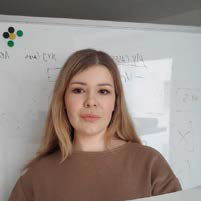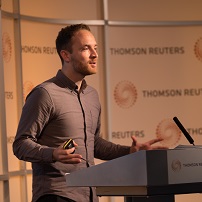Call for Participation
Design Thinking & AI
Tuesday, 25 July 2023 - 08:30-12:30
(Note: Cancelled by the workshop organizers)
Martin Boeckle, Shetty Rithesh, Sadie Johan, Kirsten Grass,
Catia Quezada, Julia Schwarz, Johannes Schleith
BCGX
boeckle.martin@bcg.com
The aim of this workshop is to connect the Artificial Intelligence (AI) and Design Thinking (DT) community to discuss and enable potential opportunities for the design of human-centered AI solutions. Furthermore, we reflect two angles. Firstly, “Design for AI” – how Design thinking can be applied for the development of such intelligent solutions. Secondly, “AI for Design” – how AI tools can be used within the product development process, for instance in the problem or solution space of a double-diamond approach.
Generally, design thinking has become a pervasive innovation approach with a huge impact on the organizational culture and core elements of the innovation process. This human-centered approach to innovation aims at solving wicked problems and enables structure and direction at the same time. Therefore, we put a strong focus on the exploration of challenges in the development or use of AI-based technologies, which may benefit from approaches like human-centered design or design thinking. For instance, the level of AI maturity in intelligent applications is constantly increasing. However, more than 80% of AI applications never reach deployment due to a wrong strategic approach, lack of data quality or missing AI awareness in employees and those that do, remain below profitability expectations.
At the same time, new opportunities emerge by transformer-based language models (e.g., GPT-3) by augmenting human innovation teams in the overall product development process. Finally, it’s important to highlight how these tools can assist in such product development tasks, but it’s also necessary to reflect on their limitations.
The workshop brings together an exciting mix of profiles (e.g., designers, engineers, data scientists and HCI experts etc.) from different domains to discuss the application of creative approaches, current tools and frameworks to gain a novel understanding of the intersection Design Thinking & AI. Such multidisciplinary networks lead to a shared understanding of challenges in the development of intelligent applications, but also reveal opportunities on how to collaborate on AI endeavors in a meaningful way. A future research agenda will be defined, which covers current research streams (e.g., explainable AI, responsible AI etc.), the role of design in AI, frameworks and tools to reveal the next frontier of Design & AI.
Furthermore, the workshop aims to strengthen the creation of an interdisciplinary research community of academics, researchers and industry professionals to foster the knowledge exchange between these stakeholders. We expect that this workshop sharpens the understanding of how design thinking can be leveraged in the process of designing AI solutions and how current AI tools might even lead to a higher innovation performance.
|
08:30 |
Start of the workshop |
|
08:45 |
Introduction session |
|
09:00 |
Lightening talk from WS organizers |
|
09:30 |
Session 1 - Design Thinking & AI challenge |
|
10:30 - 11:00 |
Coffee break |
|
11:00 |
Session 2 - Augmentation of human innovation teams |
|
12:00 |
Research agenda & networking |
|
12:30 |
End of the workshop |
Submission for the Workshop
This workshop encourages a wide range of submissions from any disciplinary background: conceptual research papers, case studies and literature reviews related to the highlighted workshop topics but not limited to.
Abstracts should also include the names, affiliations, contact data and disciplinary background of the submission team.
Prospective presenters are invited to submit either a complete manuscript or an extended 800-word abstract through the HCII Conference Management System (CMS). To ensure rigor, the submitted manuscripts or abstracts will undergo a double-blind review.
Submission for the Conference Proceedings
The contributions to be presented in the context of Workshops will not be automatically included in the Conference proceedings.
However, after consultation with the Workshop Organizers, authors of accepted workshop proposals that are registered for the conference, are welcome to submit through the Conference Management System (CMS), an extended version of their workshop contribution, to be considered for presentation at the Conference and inclusion in the “Late Breaking Work” conference proceedings, either in the LNCS as a long paper (typically 12 pages, but no less than 10 and no more than 20 pages), or in the CCIS as a short paper (typically 6 pages, but no less than 4 and no more than 8), following peer review.
The submission deadline for the camera-ready papers (long or short) for the “Late Breaking Work” Volumes of the Proceedings is the 23rd of June 2023.
|
Deadline for abstract submission: |
10 May 2023 |
|
Notification of review outcome: |
20 May 2023 |
|
Finalization of Workshop organization and registration of participants |
31 May 2023 |

Böckle Martin, PhD
Martin has a strong focus on designing human-centered digital experiences within the practice areas of BCG Platinion solving strategic design challenges through the application of qualitative and quantitative research. He is a strong advocate for behavioral design concepts like gamification and contributes to the emerging research stream of human-centered artificial intelligence (HCAI). Furthermore, he focuses on other topics such as design due diligence (DDD), design leadership and design strategy for Metaverse applications.

Shetty, Rithesh
Rithesh Shetty is an Associate Director at the BCGX in Singapore. He is an experienced digital consultant and design leader with over 17 years of experience in driving business value through innovation, digital strategy, product/service design, and user experience. With a strong emphasis on human-centered design, Rithesh has vast experience in setting up CX practice, DesignOps, leading multidisciplinary teams, and delivering large CX transformation programs across Asia-Pacific.

Sadie, Johan
Johan is a seasoned Product & Design Principal at BCG with 20 years of experience delivering customer-centred products and services globally. He specialises in design thinking and lean product development and has a successful track record leading cross-functional teams to create innovative and award-winning products and services.

Schwarz Julia
Julia is a Senior Experience Designer at BCG X in Berlin. She has held various leading design positions at global brands, multi-nationals and Fintech companies over the last 10 years and is a certified Design Thinking Specialist. Her core proficiencies include driving product design with a human centred focus, digital and physical prototyping, user interviews and testing as well as UX/UI best practises and benchmarking.

Kirsten Grass
Kirsten comes with a background of creative problem-solving and practical application. She has worked in a variety of industries, including technology, finance, and healthcare, applying design thinking methodologies to drive innovation and achieve results.

Catia Quezada
Catia has experience bridging Business, Technology and People across all levels in organisations in several industries. Her expertise is in Customer Experience Strategy, Customer Journey Redesign, Enablement on all things Design Thinking and Human Centred Transformations. Her focus is to help her clients solve complex problems with their users in mind so they can gain competitive advantage when building products and creating services.

Johannes Schleith
Johannes is an experienced product and design professional with a background in research and design leadership for human-centered artificial intelligence (HCAI) at Thomson Reuters and Thomson Reuters Labs. He is passionate about design thinking and human-centered innovation for AI powered systems and services.
Liedka, J. (2018). Why Design Thinking Works. Harvard Business Review, pp. 72-79
Verganti, R., Vendraminelli, L., Iansiti, M. (2020). Innovation and Design in the Age of Artifical Intelligence. Journal of Product Management, 37(3), pp. 212-227 https://doi.org/10.1111/jpim.12523
Boeckle, M., Kouris, I. (2022). Design Thinking and AI: A New Frontier for Designing Human-Centered AI Solutions. In proceedings of the Academic Design Management Conference ADMC22 https://www.dmi.org/page/ADMC2022Proceedings
Bouschery, Sebastian & Blazevic, Vera & Piller, Frank. (2023). Augmenting Human Innovation Teams with Artificial Intelligence: Exploring Transformer-Based Language Models. Journal of Product Innovation Management. 10.1111/jpim.12656.
Johannes Schleith and Daniella Tsar. 2022. Triple Diamond Design Process: Human-centered Design for Data-Driven Innovation. In HCI International 2022 - Late Breaking Papers. Design, User Experience and Interaction: 24th International Conference on Human-Computer Interaction, HCII 2022, Proceedings. Springer-Verlag, Berlin, Heidelberg, 136–146. https://doi.org/10.1007/978-3-031-17615-9_9
https://venturebeat.com/2019/07/19/why-do-87-of-data-science-projects-never-make-it-into-production/
https://nexocode.com/blog/posts/applying-design-thinking-to-ai/
Attendance in the workshops will be available as ‘in-person’ only. Workshops are ‘closed’ events, i.e. only authors of accepted workshop proposals, registered for the specific workshop, will be able to attend.
A registration fee of $75 is applicable for workshop participants. Workshop participants who wish to attend the Conference will need to also register for the Conference.
The total number of participants per workshop cannot be less than 8 or exceed 25.